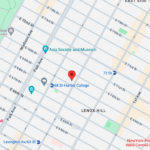A painful pinched nerve can keep you from enjoying your favorite activities. Fortunately, there are a variety of treatment options — most of which are non-surgical — that can provide relief.
Cervical radiculopathy, otherwise known as a pinched nerve in the neck, can be a debilitating injury. “Cervical” refers to the part of the spine located in the neck (where the condition occurs), and “radiculopathy” means that a nerve is being compressed or irritated. This condition is caused by stress or pressure on the spine, which often results in numbness, tingling, a burning sensation, and pain in the neck and upper limbs. These symptoms may intensify when you stretch or strain your neck or turn your head to the side.
If you’re suffering from a pinched nerve in the neck, here’s what you need to know about identifying and finding treatment for your condition.
WHAT CAUSES A PINCHED NERVE?
Cervical radiculopathy can be caused by ordinary activities like resting your arm on a chair or using crutches for a prolonged period of time. A pinched nerve may also be the result of rapid weight gain or a condition that places additional pressure on the nerves in the cervical spine.
Some common conditions that may cause cervical radiculopathy include:
- Disc herniation: A herniated disc occurs when the cartilage between the vertebrae tears or ruptures, causing the gel-like interior to protrude and press against the nearby nerves.
- Degenerative disc disease: This condition is caused by the wear and tear on the intervertebral discs that happens over time. As the cartilaginous discs lose their shock-absorbing power, additional pressure is placed on the surrounding nerves.
- Spinal stenosis: Spinal stenosis is often the result of arthritis, which damages the spinal canal. The spine gradually becomes weaker and narrower, causing increased strain to be placed on the spinal nerves.
PINCHED NERVE TREATMENT OPTIONS
Most patients with pinched nerves can recover completely with non-surgical treatments. Generally, a physician will begin by diagnosing the condition with a series of tests including an MRI and an EMG or nerve conduction study. These tests will help pinpoint the source of the problem, revealing the location of the dysfunctional nerve and the extent of the damage.
Once a patient has been diagnosed with cervical radiculopathy, there are a variety of treatments that can be effective, depending on the severity of the condition. These include:
1. Physical therapy
A physical therapist will work with you to reduce inflammation, muscle spasms, and tightness in the neck through stretches and manual therapy. Treatments may include manual nerve glides to reduce irritation and joint mobilization techniques to increase your range of motion.
2. Steroid injections
Epidural injections can help relieve pain caused by cervical radiculopathy. This procedure involves injecting anti-inflammatory medication near the affected nerve, which serves to reduce inflammation in the area. Steroid injections are often used to manage pain so that patients can continue with their physical therapy regimen.
3. Ice and/or heat therapy
Your physician may recommend applying an ice pack or heated gel pack to relieve pain due to a pinched nerve. Icing is an effective treatment for inflammation, while heat therapy can help relax muscles. Patients may want to try using both hot and cold packs to see which offers the best results.
4. Surgery
Surgery may be required for severe cases of cervical radiculopathy. The goal is to relieve pressure on the compressed nerve by removing any pieces of bone or soft tissue (like a herniated disc) that are causing irritation.
If you think you may have a pinched nerve, it’s important to visit an orthopedic specialist to find out how to manage your symptoms. As cofounder of New York Bone & Joint Specialists, Dr. Michael Y. Mizhiritsky is a top spine surgeon who specializes in musculoskeletal conditions of the neck and back. He has experience in diagnosing and treating pinched nerves, with an emphasis on nonsurgical solutions. Contact us to schedule a consultation today.



